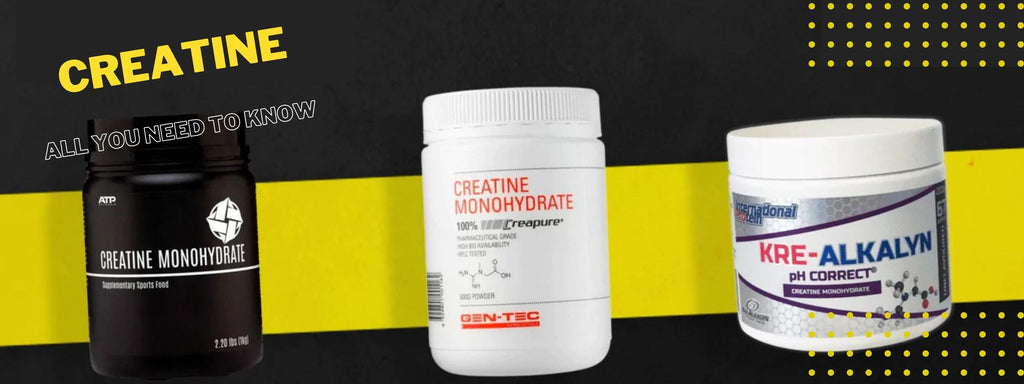WHAT DOES CREATINE DO?
Creatine is like a turbocharger for your workouts, found in foods like red meat and fish and made by your body. It’s essential for producing energy during high-intensity activities like weightlifting and sprinting. Knowing about creatine is a game-changer for anyone serious about fitness and health.
Research shows that creatine supplementation supercharges athletic performance, muscle strength, and recovery (Buford et al., 2022). Plus, it’s got some impressive cognitive benefits and neuroprotective properties (Kreider et al., 2022).
This blog dives into the science of creatine. Whether you’re an athlete or just aiming for better health, we've got you covered.
Understanding Creatine
What is Creatine?
Creatine is a compound made from three amino acids: arginine, glycine, and methionine. It’s found in foods like red meat and fish and is also produced by your liver, kidneys, and pancreas. Discovered in the early 19th century, creatine’s role in muscle metabolism has been well-documented (Harris et al., 2022).
How Creatine Works in the Body
Creatine plays a key role in making adenosine triphosphate (ATP), the energy currency of cells. During high-intensity exercise, creatine phosphate in your muscles donates a phosphate group to Adenosine Diphosphate to quickly regenerate ATP. This provides a rapid energy boost crucial for activities like sprinting and weightlifting (Greenhaff et al., 2022).
Benefits of Creatine
Enhanced Athletic Performance
Creatine boosts strength and power, making it ideal for activities requiring short bursts of high-intensity effort, like weightlifting, sprinting, and HIIT (Kreider et al., 2022). It also improves endurance and reduces fatigue by rapidly regenerating ATP, allowing athletes to train harder and longer (Jäger et al., 2022).
Muscle Growth and Recovery
Creatine promotes muscle growth by increasing water retention in muscle cells, enhancing protein synthesis, and reducing protein breakdown (Buford et al., 2022). It also aids muscle recovery post-exercise by reducing cell damage and inflammation, leading to less soreness and quicker recovery (Rawson & Venezia, 2022).
Cognitive and Neurological Benefits
Emerging research shows creatine also boosts brain health. It increases phosphocreatine stores in the brain, supporting ATP regeneration and improving cognitive function (De Andrade et al., 2022). There’s growing evidence that creatine may benefit neurodegenerative diseases like Parkinson’s and Huntington’s by providing neuroprotective effects (Turner et al., 2022).
Who Should Use Creatine?
Creatine isn’t just for athletes and bodybuilders. While it helps them enhance performance, muscle strength, power, and lean body mass (Buford et al., 2022; Kreider et al., 2022), non-athletes can also benefit. Creatine supports muscle health, cognitive function, and energy metabolism, promoting a healthy lifestyle (Jäger et al., 2022). Older adults can use it to improve muscle strength, reduce age-related muscle loss, and enhance cognitive function, while vegetarians and vegans, who typically have lower natural creatine levels, can boost muscle and cognitive health through supplementation (Rawson & Venezia, 2022; De Andrade et al., 2022).
Types of Creatine Supplements
Creatine Monohydrate
Creatine monohydrate is the most common and extensively researched form. It increases muscle strength, power output, endurance, and recovery times, making it the gold standard of creatine supplements (Kreider et al., 2022). It’s affordable and highly soluble in water, but some users might experience minor gastrointestinal discomfort or water retention (Jäger et al., 2022). Despite these minor drawbacks, creatine monohydrate remains the top choice for many athletes and fitness enthusiasts due to its proven benefits and cost-effectiveness.

Buy Now
Final Note
Creatine is a powerhouse supplement that boosts energy, improves muscle strength and recovery, and offers cognitive benefits. Whether you’re aiming to elevate athletic performance or support muscle and brain health, creatine can help you achieve your goals. Embrace creatine and enhance your journey toward better health and peak performance.
Thanks for diving into the world of creatine with us. Stay informed, stay healthy, and keep crushing those fitness goals!



